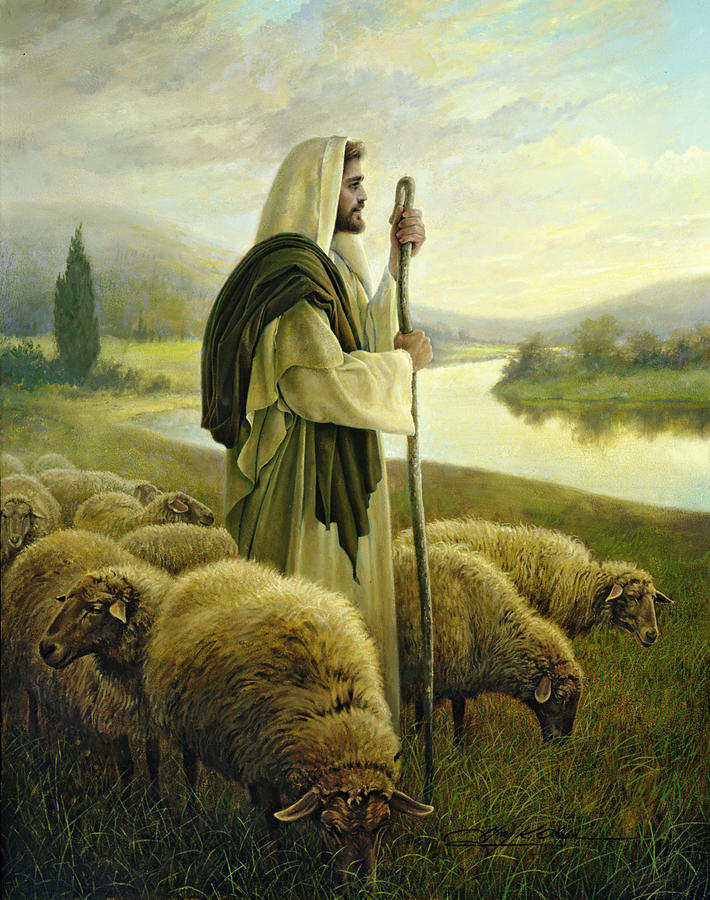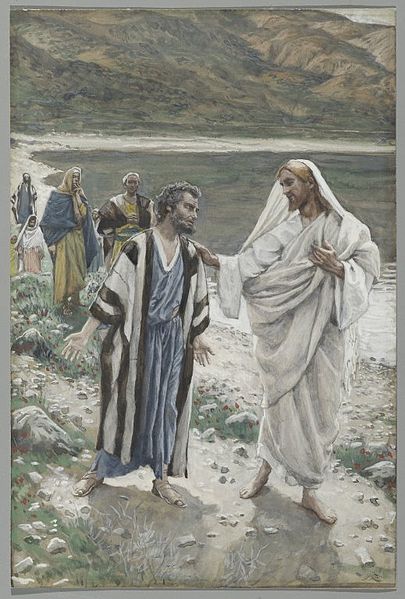Scripture readings: Acts 4:5-12; Ps. 23; 1 John 3:16-24; John 10:11-18 Sermon by Sheila Graham (from John 10:11-15; Ps. 23; 1 John 3:16-24; Acts 4:5-12)
It’s About Sheep
Introduction
Rock, vine, lamb of God, bread of life, light of the world, many are the metaphors used for our Savior, but one of my favorites is that of good shepherd. The reference to sheep was used frequently in the Scriptures because the people of that time were familiar with sheep and shepherds.
Sheep are social animals. They get a little stressed out if they are separated very far from the flock. If a sheep does isolate itself from the rest of the flock the shepherd needs to be concerned because it might be lost or ill. Sheep are easily led, which can be good or not so good. If one sheep makes a move, the rest will follow. Back in 2006, in eastern Turkey, a sheep tried to cross a 50-foot-deep ravine and plunged to its death. Four hundred of its fellow sheep followed.
Domesticated sheep have a lot of needs. They need plenty of pasture for food. Two acres of good pasture, not rocky soil, can sustain six sheep. Sheep spend up to seven hours a day grazing. They need access to clean water and they need salt. They need to have that heavy coat of wool maintained as well as their hooves. They need some kind of shade in hot weather. If they injure themselves, they need medical help.
But one of the most important needs sheep have is protection from predators. If sheep are threatened they hover together. That’s the only protection they can provide for themselves against wolves, coyotes or sheep-killing dogs. They need the extra protection that comes from their shepherd.

(used with permission)
Jesus, the good shepherd
So when Jesus referred to himself as the good shepherd who cared about his sheep, people knew what he was talking about. Let’s notice what Jesus says in John 10:
I am the good shepherd. The good shepherd lays down his life for the sheep. The hired hand, who is not the shepherd and does not own the sheep, sees the wolf coming and leaves the sheep and runs away—and the wolf snatches them and scatters them. The hired hand runs away because a hired hand does not care for the sheep. I am the good shepherd. I know my own and my own know me, just as the Father knows me and I know the Father. And I lay down my life for the sheep. (John 10:11-15, NRSV)
A good shepherd not only has concern for the sheep, but also is ready to face any danger to protect them. Jesus is the divine Shepherd who cared for us so much he gave his life for us.
Another scripture that comes to mind about good shepherds is Psalm 23, the beautiful psalm many of you have probably memorized at one time or another. Let’s look at it again, keeping in mind those needy sheep, and who those sheep represent. There are many spiritual analogies in this psalm. Let’s look at a few.
The LORD is my shepherd, I shall not want. He makes me lie down in green pastures; he leads me beside still waters; he restores my soul. He leads me in right paths for his name’s sake. (Ps. 23:1-3, NRSV)
We see the analogies right away. First, our Good Shepherd provides for our needs and second, we can know that wherever he leads is the right way for us to go. We can have absolute trust in him.
Even though I walk through the darkest valley, I fear no evil;
for you are with me; your rod and your staff—they comfort me. (Ps. 23:4, NRSV)
We do not have to fear whatever we may have to face in our lives, even death, because our Good Shepherd is always right there to protect and comfort us through our trials. We have no doubts about his love. He’s already given his life for us.
You prepare a table before me in the presence of my enemies; you anoint my head with oil; my cup overflows. (Ps. 23:5, NRSV)
Our Shepherd is very generous in his love and concern for us. Do you sometimes feel overwhelmed with all the blessings God gives? In this country, it’s not only spiritual blessings, it’s physical blessings as well. Most of us don’t have to worry about where we’re going to sleep tonight or where our next meal is coming from. And, we’re free to come here together to worship our God. Most of the people in the world don’t have those luxuries.
Surely goodness and mercy shall follow me all the days of my life, and I shall dwell in the house of the LORD my whole life long. (Ps. 23:6, NRSV)
Those blessings aren’t just for this life—they go on forever. What a promise from our Good Shepherd!
Our response
What should be our response to such unconditional overwhelming love? The apostle John tells us:
We know love by this, that he laid down his life for us—and we ought to lay down our lives for one another. How does God’s love abide in anyone who has the world’s goods and sees a brother or sister in need and yet refuses help? (1 John 3:16-17 NRSV)
It always comes back to this, doesn’t it—love, God’s love. That’s who he is. And God’s love is not just a sweet sentiment—love is expressed in action. The Good Shepherd doesn’t lie under a shade tree talking about how much he loves his sheep. He’s up and about watching over them, seeing what they need, searching for the strays, taking care of them. John continues:
Little children, let us love, not in word or speech, but in truth and action. And by this we will know that we are from the truth and will reassure our hearts before him whenever our hearts condemn us; for God is greater than our hearts, and he knows everything. Beloved, if our hearts do not condemn us, we have boldness before God; and we receive from him whatever we ask, because we obey his commandments and do what pleases him. (1 John 3:18-22, NRSV)
There is so much in these scriptures to mull over, to think about, to pray about, for God’s love is so deep and so wide and so high it’s impossible to contain it. Yet love is what he’s asking us to do, even expecting us to do, to love as he loves, unconditionally and actively. Like the Good Shepherd, not just talking the talk, but walking the walk.
Peter’s mission and ours
As we read in John 21:15-17, after his resurrection, Christ asked Peter three times if he loved him. Peter answered yes three times. Jesus then gave Peter a command related to his mission: feed my lambs and tend my sheep. We read about the basis of that command in 1 John:
This is his commandment, that we should believe in the name of his Son Jesus Christ and love one another, just as he has commanded us. All who obey his commandments abide in him, and he abides in them. And by this we know that he abides in us, by the Spirit that he has given us. (1 John 3:23-24, NRSV)

(public domain via Wikimedia Commons)
How could Peter do what Jesus commanded? What did Jesus mean? He had told him three times he loved him. Why did Jesus respond to him in the way he did? Maybe Peter was wondering what Jesus meant when he told him to feed and tend his sheep. The disciples weren’t always good at figuring Jesus out. Nevertheless, it didn’t take Peter long to work it out, as we see in our reading today in the book of Acts:
The next day their rulers, elders, and scribes assembled in Jerusalem, with Annas the high priest, Caiaphas, John, and Alexander, and all who were of the high-priestly family. When they had made the prisoners stand in their midst, they inquired, “By what power or by what name did you do this?” Then Peter, filled with the Holy Spirit, said to them, “Rulers of the people and elders, if we are questioned today because of a good deed done to someone who was sick and are asked how this man has been healed, let it be known to all of you, and to all the people of Israel, that this man is standing before you in good health by the name of Jesus Christ of Nazareth, whom you crucified, whom God raised from the dead. This Jesus is the stone that was rejected by you, the builders; it has become the cornerstone. There is salvation in no one else, for there is no other name under heaven given among mortals by which we must be saved.” (Acts 4:5-12, NRSV)
Did you notice that the rulers, elders and scribes of Israel asked the same questions of Peter: How are you doing what you are doing? How are you doing these miraculous works? Peter told them how: through one name and one name only. It’s through and by the same name, which means the same authority and power, that we are able to do what Jesus wants us to do—to take the gospel to the world. We do so through our close relationship with him, by his Spirit.
Conclusion
Do you ever think of the people in the world as lost sheep? That’s how Jesus views them—belonging to him, yet lost, vulnerable, in danger, needing to be saved. Those lost sheep might be in your own family, or some of your coworkers, or your next-door neighbors. Jesus loves them and wants them to be brought into his flock where there is hope, comfort, peace, salvation, eternal life with him.
Jesus sees these people as his lost sheep, his personal lost sheep. He has given his life for them. He wants them found. Jesus says to us: feed my lambs and tend my sheep.



Thanks for the message. It rekindles the passion.